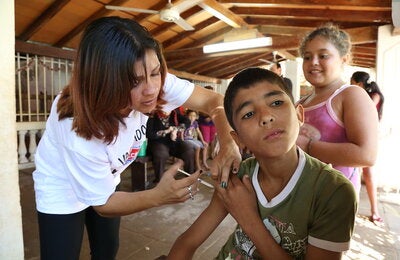Washington, D.C., October 12, 2017 (PAHO/WHO) - Suriname officially launched its National Malaria Elimination Strategy with the aim of eliminating local malaria transmission in the country by 2020. The Pan American Health Organization (PAHO) supports the country towards the elimination of the disease and in preparing for subsequent certification by the World Health Organization (WHO).
As part of this process, the Ministry of Health has requested support from PAHO/WHO for the external evaluation of the National Malaria Surveillance System. In response to the request, a PAHO-led team of internal and external experts reviewed the implementation of the country's malaria diagnosis, treatment, investigation, and response system with national authorities and health workers in the field, from 2 - 9 October 2017.
Dr. Marcos Espinal, Director of the Department of Communicable Diseases and Health Analysis at PAHO, led the team of experts and had met with the Vice President of Suriname, H.E Ashwin Adhin, the Minister of Health, Patrick Pengel, and the Minister of Foreign Affairs, Yldiz Pollack-Beighle.
The mission included visits among service providers at all levels; review of instruments used for the collection, reporting, and storage of malaria data in the country; and assessment of the quality of the diagnosis and treatment services, supply chain management and the demand for malaria services in remote districts and communities, among others.
After the success of the controlling malaria transmission in the coastal areas, urban towns, the capital city and residential villages in the interior, nowadays the highest risk group are small-scale gold miners called "garimpeiros". The malaria elimination work primarily concentrates in these settings, and to meet the health needs of vulnerable and migrant population.
Dr. Yitades Gebre, PAHO/WHO Representative in Suriname emphasized that the country needs the cooperation and support of its bordering countries and territories through the spirit of solidarity and purpose of unity. "The newly launched strategic plan for elimination articulates innovative ways of addressing the problem and ensures to leave no one behind with 2020 focus and certification." PAHO, through its regional funding from USAID and other donors has extended support in strategic planning, surveillance, monitoring of molecular characterization of the parasite, and capacity building efforts for refresher training of malaria microscopist," he said.
Dr. Espinal during his address at the launch of the country's National Malaria Elimination Strategy said that PAHO commits to supporting the country towards achieving its malaria elimination goals. "PAHO will be with you in this quest. Our technical experts will be at your disposal to make sure you are not alone in this endeavor so any technical challenge is fully addressed."
The Ministry of Health Malaria Program in Suriname is responsible for malaria activities in the country. Suriname has reached the Millennium Development Goals for Malaria in 2015. As of 2016, Suriname reported 334 confirmed cases of malaria and no recorded deaths, representing a decrease in malaria morbidity of approximately 99% compared to 2000.
Suriname was recognized twice as a Malaria Champion of the Americas- a successful mechanism to keep countries at the forefront of creativity and innovation to defeat this disease. In 2010, for strengthened partnerships, community mobilization, and implementation of a comprehensive malaria program that extended to border areas and mobile populations that drastically curb local transmission, and again in 2016 for achieving a substantial reduction of cases in an area with high malaria burden, accomplished through highly proactive and innovative interventions that transcend borders and ethnicities for the provision of services to populations in situations of vulnerability to foster greater equity and impact.
In 2016, the 55th Directing Council of PAHO approved a plan of action for eliminating malaria and preventing its reintroduction into areas already free of malaria, with intensified efforts focusing on vulnerable populations and occupational groups. PAHO provides technical cooperation, coordinates regional efforts, and help mobilize resources for national and cross-border programs targeting malaria.



